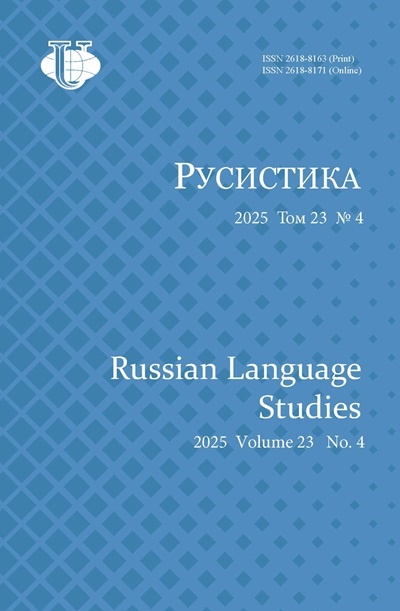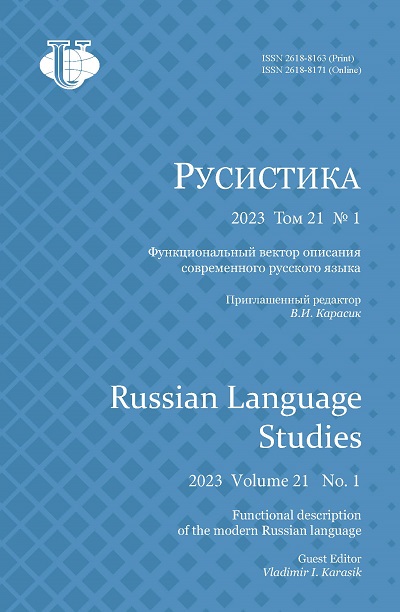Том 21, № 1 (2023): Функциональный вектор описания современного русского языка
- Год: 2023
- Статей: 8
- URL: https://journals.rudn.ru/russian-language-studies/issue/view/1637
- DOI: https://doi.org/10.22363/2618-8163-2023-21-1
Весь выпуск
Актуальные проблемы исследований русского языка
Речевые акты и русский текстопорождающий дискурс
Аннотация
Актуальность исследования определяется скрытой турбулентностью таких часто используемых в русистике понятий, как «речевая деятельность», «речевые акты» и «дискурс». Цель работы - определение генетических связей этого триединства и функционального предназначения каждой из рассматриваемых категорий. Основной инструментарий исследования - авторский метод дискурсивно-модусного анализа художественной речи. Материалами исследования послужили словарные дефиниции из толковых словарей русского языка, в частности из «Словаря экспрессивных устойчивых фраз русского языка» В.Ю. Меликяна, а также высказывания, извлеченные из Национального корпуса русского языка. Установлено, что коммуникативно-речевой акт представляет собой синергийное сочетание ментально-психической и речевой деятельности. В ментально-психической деятельности сопряжены ментальные акты - мыслительные процессы коммуниканта в момент его локутивной готовности производить высказывание и психическая деятельность, ведущая поиск адекватных способов отражения коммуникативно значимого события в дискурсивном сознании общающихся. Ментально-психическая деятельность с помощью средств языковой системы кодирует и декодирует смысловое содержание авторских интенций. Речевая деятельность производит речевые акты - функциональные единицы речевого общения, которые воплощают целенаправленное речевое действие. Даны обобщения категориальной сущности речевого акта и дискурса. Перспективой исследования является разработка на материале русского языка когнитивно-прагматической теории речемыслительной деятельности.
 7-17
7-17


Лексико-синтаксические актуализаторы хеджирования в русском языке: опыт анализа отзывов о диссертации
Аннотация
Анализируются русские лексико-синтаксические актуализаторы хеджирования как риторической стратегии смягчения негативной оценки результатов рецензируемого исследования. Актуальность работы обусловлена переосмыслением природы академического дискурса, который рассматривается не только как информационная среда, но и как интерактивное пространство. Данный подход детерминирует потребность изучения языковых средств конструирования гармоничного диалога с адресатом. Цель исследования - количественный и интерпретативный анализ лексико-синтаксических средств русского языка, актуализирующих стратегию хеджирования в корпусе исследуемых текстов. Материалом послужили 90 отзывов официальных оппонентов о диссертациях, опубликованных на сайтах диссертационных советов в 2019-2022 гг. Научную новизну определяет использование в качестве объекта исследования жанра отзыва о диссертации, в котором впервые изучаются языковые средства смягчения негативной оценки, функционирующие на двух языковых уровнях. Для анализа лексико-синтаксических средств, актуализирующих стратегию хеджирования, применялись методы количественного и интерпретативного анализа. Результаты количественного анализа показали, что в текстах отзывов стратегия хеджирования преимущественно актуализируется с помощью глаголов, наречий и вводных конструкций. Интерпретативный анализ выявил, что хеджи реализуют несколько коммуникативных функций: смещение фокуса высказывания, модусная митигация критики и деинтенсификация негативной оценки. Исследование вносит вклад в изучение академического дискурса, а также в такие разделы лингвистики, как прагмалингвистика, теория текста и дискурса. Перспективным направлением может стать анализ лексико-грамматических средств русского языка, участвующих в актуализации других метадискурсивных стратегий.
 18-32
18-32


Себе и вполне себе: семантика, прагматика, функции
Аннотация
Наблюдение за лексическими единицами, отражающими картину мира современного человека, всегда вызывало особый интерес у лингвистов, поскольку позволяло наглядно изучить модные слова и выражения как индикаторы языкового вкуса эпохи. Актуальность исследования обусловлена необходимостью изучать тенденции изменения употребления разговорных лексических единиц как маркеров, обозначающих особенности когнитивного и социального развития личности на современном этапе. Цель - охарактеризовать функции и прагмасемантические значения частицы себя и оборота вполне себе в современной русской лингвокультуре. В качестве материала взяты данные толковых словарей русского языка и примеры из Национального корпуса русского языка. Применены метод контекстуального и интерпретативного анализа, элементы количественного анализа и метод семантического анализа словарных дефиниций. Установлено, что достаточно часто свобода и независимость действий протагониста высказывания, передаваемые этой частицей, его автономность и суверенность получают отрицательную оценку субъекта речи: они рассматриваются как равнодушие, безразличие к окружающим, пренебрежение этическими нормами и нормами общежития и осуждаются, и эта оценка подчеркивается присутствием в высказывании частицы себе . Определено, что что повышение уровня речевой активности частицы себе в современной речи связано с изменением модального типа российской личности. Семантическое ядро, в котором сфокусированы базовые смыслы оборота вполне себе , сосредоточено в лексеме вполне , а на долю частицы себе остаются смыслы прагмастилистические. Выявлено, что основным коммуникативным назначением выражения вполне себе представляются функции снятия с себя ответственности за достоверность содержания высказывания, выделения предмета речи и отождествления говорящего с элитной в его представлении социальной группой. Будучи модным выражением, оборот вполне себе в наши дни активно используется в Рунете, проникает в публичную речь, достигает апогея своей популярности и затем с высокой степенью вероятности уступит место новым индикаторам языковой моды.
 33-48
33-48


Функциональная парадигма в русистике: от функционирования единиц к регулятивной концепции языка
Аннотация
Сегодня русский язык вышел за рамки России и формирует планетарный русскоязычный мир, поэтому русистика, предметом которой традиционно считается литературная форма языка, стремится выйти на новый уровень осмысления как языка, так и отдельных фактов. Актуальность исследования обусловлена тем, что на современном этапе в языкознании на первый план выдвигаются идеи синтеза, проявляются тенденции к разработке теории языка, позволяющей интегрировать новейшие достижения разных направлений лингвистики на единой основе. Сопоставлена регулятивная концепция языка в работах А.Н. Рудякова с работами других лингвистов с целью установить ключевые особенности и постулаты новой лингвистической парадигмы и дать определение языку как регулятивной системе на основании принципов лингвистического функционализма. Посредством использования дедуктивного и аналитико-теоретического методов, а также метода моделирования описывается современное состояние научной лингвистической парадигмы и общелингвистических проблем, связанных с исследуемыми понятиями, устанавливаются ключевые особенности современной научной лингвистической парадигмы, поскольку без определения теоретических ориентиров современная наука о языке утрачивает свою практическую ценность. Обосновывается идея о том, что новая парадигма - это не только обращение к новому материалу и новым методам исследования, но создание принципиально новой теории, которая будет учитывать роль языка в социуме с учетом его онтологической, функциональной сущности. На основе определения ключевых особенностей функционального подхода к языку и его единицам демонстрируется, что лингвистика не просто граничит с другими науками, но является в некотором роде их составной частью, основой человеческого универсума. В перспективе представленный материал позволяет увидеть, что смена научной парадигмы, несмотря на объективные сложности, сегодня является обязательным условием дальнейшего развития лингвистики. Также намечается круг задач теоретических и практических, которые стоят перед современной лингвистикой и могут быт решены в рамках новой парадигмы.
 49-63
49-63


Презентация видо-временных форм русского глагола при описании кинесического поведения героев рассказов А.П. Чехова
Аннотация
Невербальная семиотика является одним из ведущих направлений изучения современной коммуникации. Исследование посвящено актуальной междисциплинарной проблеме - взаимосвязи невербальной семиотики и русской грамматики. Цель исследования - охарактеризовать репрезентацию видо-временных форм русского глагола при описании кинесического поведения литературных героев. Элементы невербальной семиотики проанализированы на материале рассказов А.П. Чехова «Смерть чиновника», «Хамелеон», «Толстый и тонкий», «Лошадиная фамилия», «Хирургия». В качестве основных применялись дескриптивный, семантической экспликации, дифференциальный, аналитико-описательный методы. Рассмотрены методологические основания кинесики как науки интегративного типа, выявлена корреляция между вербальной реализацией кинемы и видо-временными формами русского глагола. Доказано, что наиболее рекуррентными проявлениями невербальной семиотики в рассказах Чехова являются коммуникативные эмблемы (в частности, этикетные и ритуальные), симптоматические эмблемы и динамические дескрипторы, для номинации которых используются видо-временные формы русского глагола. Эмблемы-иллюстраторы квантитативно менее представлены в проанализированных рассказах писателя, что является перспективой дальнейшего исследования на примере произведений классиков русской литературы.
 64-78
64-78


Парадигматика сложносокращенного слова как средство прогнозирования эквивалентностных отношений
Аннотация
Описываются методики поиска и прогнозирования на основе парадигматических отношений, в которые вступает аббревиатура и ее дешифровальные стимулы, коррелятов сложносокращенного слова, входящих в его гнездо эквивалентности. Актуальность исследования определяется тем, что оно устанавливает принципы формирования словарных статей для создаваемого экспериментальной лабораторией исследований тенденций аббревиации при кафедре русского языка Донецкого национального университета «Толкового словаря сложносокращенных слов русского языка», дает общее представление о возможностях множественной мотивации и дешифровальной интерпретации значения сложносокращенного слова на актуальном срезе языка. Цель исследования - продемонстрировать на основе описания парадигматических отношений сложносокращенного слова и его дешифровальных стимулов с другими словами и словосочетаниями обобщенную картину используемых при составлении словаря методик поиска и прогнозирования содержания гнезд эквивалентности сложносокращенных слов. Рассматриваются и используются методики чистого поиска по существующим словарям сокращений и текстам, в которых аббревиатура и ее эквиваленты представлены как абсолютные синонимы, а также методики экстраполяционного прогнозирования по дешифровальным матрицам гнезд эквивалентности слов, связанных с описываемыми аббревиатурами и их дешифровальными стимулами парадигматическими отношениями. Последнее обусловило также формирование типологии парадигматических объединений сложносокращенных слов, включающей аббревиатурное гнездо, аббревиатурно-ономасиологическое поле, аббревиатурную группу и аббревиатурную парадигму. Новизна исследования в том, что в нем впервые описывается набор методик поиска и прогнозирования эквивалентов сложносокращенного слова, формирующих его гнездо эквивалентности, а также представляется методика верификации полученных результатов. Полученные результаты обеспечивают возможность полноценного всестороннего словарного описания сложносокращенных апеллятивов. В дальнейшем предполагается разработка методик поиска эквивалентов для других формально-ономасиологических типов аббревиатур - инициальных аббревиатур и сложносокращенных онимов.
 79-96
79-96


Лингвокультурология: теоретические и прикладные аспекты
Аксиология власти в русской лингвокультуре
Аннотация
Актуальность лингвокультурного моделирования власти обусловлена высокой значимостью этого феномена в институциональной и личностной коммуникации и многомерностью его оценочных характеристик. Цель исследования - определить и описать лингвистически релевантные нормы поведения, закодированные в концепте «власть». В качестве материала для анализа использовались данные словарей и справочников, примеры из Национального корпуса русского языка, текстовые фрагменты поэтических и прозаических произведений на русском языке. Применялись методы семантического, контекстуального, интерпретативного и ассоциативного анализов. Установлено, что в понятийном плане власть представляет собой принуждение и включает: 1) условие (силу, авторитет, традицию или закон); 2) борьбу за получение и удержание власти; 3) проявление власти (лица или организации, наделенные властью, сферы ее применения и степень принуждения); 4) ее оценку (справедливая/несправедливая, жестокая/милосердная, эффективная/неэффективная). В образном плане выделяются ситуативные характеристики проявления власти, вербализуемые в текстовых фрагментах и реакциях информантов. Концептуализация власти является дискурсивно специфичной. Выявлено, что наиболее ярко ситуативные характеристики реализации власти отмечены в публицистике применительно к ее представителям. В художественном тексте (преимущественно в поэзии) власть показана как непреодолимая сила. В оценочном плане можно выделить нормы поведения, ассоциируемые с пониманием власти - принятие ее как важнейшего условия общественного порядка и осуждение чрезмерного стремления к власти и злоупотребления ею. Эти нормы, выраженные в пословицах, анекдотах и афоризмах, в значительной мере совпадают, различаясь в том, что пословицы рекомендуют держаться от власти подальше, анекдоты остро критикуют коррупцию во власти, в афоризмах дана целостная картина должного поведения носителей власти и подчиненных. Перспективы исследования состоят в определении лингвистически релевантных личностных типовых оценок власти.
 97-110
97-110


Методика преподавания русского языка как родного, неродного, иностранного
Методика обучения русскому языку иностранных магистрантов негуманитарного профиля в современных образовательных условиях
Аннотация
Актуальность исследования обусловлена отсутствием методической концепции и программы обучения иностранцев, поступающих в российскую магистратуру после окончания бакалавриата на родине. Как правило, для этих учащихся характерна слабая подготовка по русскому языку, что оказывает прямое негативное воздействие на процесс формирования у них профессионально-коммуникативных навыков и умений, необходимых для овладения в вузе предметной компетенцией. Цель исследования - предложить методику профессионально-языкового образования иностранных магистрантов негуманитарных специальностей в условиях лингвообразовательной ситуации, которая характеризуется сокращением учебного времени, слабой общей языковой подготовкой учащихся и/или отсутствием представления о языке специальности. Применялись методы включенного и опосредованного наблюдения за учебной и коммуникативной деятельностью магистрантов в процессе изучения учебного материала по предлагаемой методике, сопровождавшиеся анализом, фиксацией, описанием и обобщением сопутствующих изменений, а также анализом коммуникативных потребностей и ошибок учащихся. Исследование проведено на материале практики обучения научной речи иностранцев-нефилологов 1-го курса бакалавриата и магистратуры Инженерной академии, Института экологии, факультета физико-математических и естественных наук РУДН, входных, промежуточных и итоговых контрольных работ и тестов. Разработана методика, на основе которой создана программа обучения, включающая систему текстовых и лексико-грамматических заданий как для аудиторной, так и для самостоятельной работы, адаптированная для рассматриваемого контингента учащихся с использованием приемов и методов технологии развития критического мышления. Данная технология позволяет формировать и совершенствовать не только лингвистические, но и когнитивные и метакогнитивные умения магистрантов, расширяя возможности самообразования, способности к самостоятельному решению многих задач без участия преподавателя. Представляется перспективным использование полученных результатов для создания полноценного пособия по научной речи не только для магистрантов, но и для аспирантов, которые прошли курс предшествующего этапа профессиональной подготовки на родине.
 111-125
111-125















